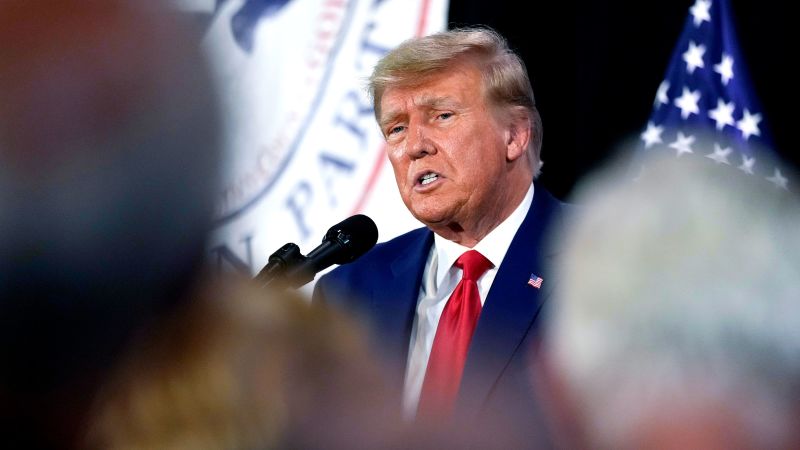The High-Stakes Legal Battles Facing Trump: What You Need to Know
Introduction:
Former President Donald Trump is facing a series of legal battles that could have far-reaching implications. From claims of election interference to potential trial dates, the drama surrounding Trump’s legal woes is intensifying. Here’s a breakdown of the key details you need to know.
1. Trump’s False Claims and Conspiracy Theories:
Trump and his allies are already spinning a narrative that the Biden administration and the judiciary are conspiring against him. They argue that the four indictments against him are examples of election interference. Discover the latest developments in this high-stakes battle.
2. Legal Maneuvering and Trial Delays:
Trump’s legal team is using the political turmoil to argue for trial delays until after the next election. However, the judge overseeing the case has set a trial date for May, which may be subject to change. Uncover the strategies being employed by both sides and the potential impact on the trial timeline.
3. Early Bids for Trial Dates:
Prosecutors are making aggressive opening moves to secure earlier trial dates, even if more time is needed for the defense to prepare. Learn about the implications of these bids and the potential outcomes for the trials.
4. Balancing Free Speech and Fair Trials:
Judges will face critical decisions beyond trial dates, including Trump’s ability to comment on the cases, attack judges and prosecutors on social media, and refer to possible witnesses. Delve into the legal minefield surrounding Trump’s First Amendment rights and the need to protect a fair trial.
5. Public Perception and Judicial Independence:
With Trump’s supporters believing he is being unfairly treated, the judiciary’s reputation is at stake. Explore the risks of the judiciary being perceived as biased and the potential consequences for accountability institutions.
6. Procedural Challenges and Delays:
The complexity of the cases and the number of co-defendants pose significant challenges. Even procedures like jury selection can prolong the process. Gain insights into the potential obstacles and the impact on trial timelines.
7. Coordinating Multiple Trials:
Trump’s legal troubles extend beyond a single case. With another trial scheduled in Manhattan, the Georgia case’s completion before the Manhattan trial seems unlikely. Uncover the implications of coordinating multiple trials and the potential timeline for resolution.
Conclusion:
As the legal battles intensify, the stakes are higher than ever for Trump and the justice system. Stay informed about the latest developments and the potential outcomes of these high-profile cases. The legal drama surrounding Trump’s future is far from over.
Title: How Trump Trials During an Election Maelstrom are Shaping Judges’ Future
Introduction:
The presidency of Donald J. Trump will undoubtedly be remembered as one of the most tumultuous periods in American political history. Amidst the chaos and controversy that defined his tenure, Trump’s impeachment trials and legal battles have had a profound impact on the judiciary. As the nation grapples with the consequences of his presidency, it is crucial to examine how these trials during an election maelstrom are shaping the future of judges in the United States.
1. The politicization of the judiciary:
One of the most significant consequences of Trump’s trials has been the heightened politicization of the judiciary. Throughout his presidency, Trump appointed numerous conservative judges, including three Supreme Court justices. These appointments, coupled with the highly partisan nature of his impeachment trials, have further polarized the judiciary. As a result, judges are increasingly seen through a political lens, eroding public trust in the impartiality of the judicial system.
2. The erosion of judicial independence:
Trump’s relentless attacks on the judiciary, often labeling judges as “Obama judges” or “activist judges,” have undermined the principle of judicial independence. By questioning the legitimacy of court decisions and openly criticizing judges, Trump has created an environment where judges may feel pressured to align their rulings with political ideologies rather than the rule of law. This erosion of judicial independence threatens the very foundation of a fair and impartial judiciary.
3. The rise of judicial activism:
Trump’s trials have also highlighted the growing trend of judicial activism. As the president faced legal challenges, judges were thrust into the spotlight, making consequential decisions that shaped the course of his presidency. These high-profile cases have emboldened judges to take a more active role in shaping public policy, often stepping beyond their traditional role of interpreting the law. This shift towards judicial activism raises concerns about the separation of powers and the potential for an overreach of judicial authority.
4. The impact on future nominations:
The trials and legal battles during Trump’s presidency have set a precedent that will undoubtedly influence future judicial nominations. The intense scrutiny and partisan battles surrounding these appointments have raised the stakes for both presidents and nominees. The confirmation process has become increasingly contentious, with nominees facing heightened scrutiny of their political affiliations and ideological leanings. This trend may result in a more polarized judiciary, further exacerbating the already deep divisions within the country.
Conclusion:
The trials and legal battles that unfolded during Donald Trump’s presidency have left an indelible mark on the judiciary. The politicization of the judiciary, erosion of judicial independence, rise of judicial activism, and the impact on future nominations are all significant consequences that will shape the future of judges in the United States. As the nation moves forward, it is crucial to reflect on these developments and work towards restoring public trust in the judiciary, ensuring that judges remain impartial and committed to upholding the rule of law. Only then can the judiciary fulfill its vital role as a check on executive power and safeguard the principles upon which the United States was founded.








